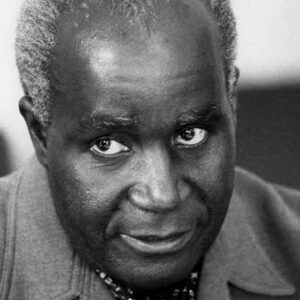Kenneth Kaunda was the first independent President of Zambia (1964-1991). He was instrumental in the Zambian independence movement. During his administration, Kaunda (nicknamed KK) frequently acted as a buffer between the predominantly white southern African governments and the predominantly black northern sovereign states. In an effort to take the region closer to independence from British administration, he made the courageous decision to leave the African National Congress. He created the Zambian African National Congress after his departure. The objective of the ZANC was to advocate the rights of black people, but the party was banned following an outbreak in civil disobedience. After leaving the African National Congress and the ZANC being banned, Kaunda became the leader of the United National Independence Party. As President of Zambia, Kaunda, a charismatic leader, was initially revered by the population, but with time, they grew disillusioned with his policies. After more than two decades as president, he resigned voluntarily in response to pressure to implement multiparty politics.
Youth and Early Life
Kenneth David Kaunda was born on April 28, 1924, in Chinsali, Northern Rhodesia, at the Lubwa Mission (now Zambia). He is the eighth and youngest child. Mother was the first African woman to teach in colonial Zambia.
From 1941 until 1943, he attended the Munali Training Centre. Lusaka was where the training center was located.
1943, after completing his studies at the Training Center, he began teaching at Lubwa’s Upper Primary School. He was also the school’s headmaster from 1944 until 1947.
After leaving school in Lubwa, he established a farmers’ cooperative in a copper mining region. In 1948, he also became a mining welfare officer.
However, he was unable to avoid teaching, and from 1948 to 1949 he served as the headmaster of Mufulira Upper School.
Kenneth Kaunda’s Career
Kaunda helped founded the African National Congress (ANC), Northern Rhodesia’s first significant anti-colonial establishment group. He served as the group’s secretary-general from 1953 to 1958 under ANC president Harry Nkumbula.
In 1958, disillusioned with Nkumbula’s tactics, he left the African National Congress and founded the Zambia African National Union. After a rise of civil disobedience in 1959, his party was banned. This resulted in nine months of imprisonment for Kaunda.
After his release in 1960, he became the leader of the newly formed United National Independence Party (UNIP). He was elected to the Legislative Council two years later.
He visited Martin Luther King Jr. in Atlanta, Georgia, in 1960. He went on to establish a civil disobedience campaign, known as the Cha-cha-cha campaign, after being inspired by Martin Luther King Jr. Participants in this campaign committed arson and obstructed important roads.
In October 1964, Zambia attained its independence, and Kaunda was elected the nation’s first president.
His charisma and intolerance for opposition allowed him to remain in power, but they eventually led to his downfall.
Under pressure to create multiparty politics, he resigned from the presidency in 1991. Movement for Multiparty Democracy with Frederick Chiluba as president won the election.
After being accused of involvement in a failed coup attempt in 1997, he left politics.
Kaunda’s Major Opera
Kaunda adopted a policy that supplied children with free school supplies, like as pens, pencils, and exercise books, in an effort to enhance education in his country. These goods were provided to children regardless of their parents’ socioeconomic position.
1966 saw the establishment of the University of Zambia and Kaunda’s appointment as its Chancellor. In 1969, he was also invited (and agreed) to preside over the inaugural commencement ceremony.
In 1968, he enacted the Mulungushi Reforms, in which he intended to acquire significant stakes in foreign-owned companies in order to stimulate the economy. He was able to obtain shares in the Anglo American Corporation and the Rhodesia Selection Trust, merged the two firms, and named the resulting organization Nchanga Consolidated Copper Mines (NCCM).
NCCM and Roan Consolidated Mines amalgamated to form Zambia Consolidated Copper Mines Ltd. in 1983. (ZCCM).
During the Lumpa Crisis of 1964, Kaunda outlawed the Lumpa Church, fostering antagonism between the church and the UNIP. Kaunda was never totally successful in reducing the enmity.
Following his resignation from politics, Kaunda has campaigned to combat HIV/AIDS.
Awards & Achievements
From 2002 to 2004, he served as “African President-in-Residence” at the African Presidential Archives and Research Center at Boston University.
He earned the Ubuntu Award from the National Heritage Council in 2007.
President Michael Sata awarded him the title of Roving Ambassador.
Personal History and Legacy
He married Beatrice Kaweche Banda in 1946, and she bore eight children. They stayed wed until her passing in 2012
He has been noticed in the crowd of Dancing with the Stars as an avid ballroom dancer.
Estimated Net Worth
Kenneth Kaunda’s estimated net worth is $2,000,000, and his primary source of income is as a politician. We lack sufficient evidence regarding Kenneth Kaunda’s automobiles and way of life.
Trivia
HIV/AIDS claimed the life of one of this former Zambian president’s children in the 1980s.
President Chiluba attempted to deport Kaunda since he was not Zambian but Malawian.
He was deemed stateless by the Ndola High Court in 1999. This ruling was overturned in 2000, and he was made a Zambian citizen.
He was one of the speakers during Nelson Mandela’s funeral who delivered eulogies. When he exceeded the permitted time, organizers attempted to convince him to leave the podium. When he remarked that the organizers were “trying to manage an old man who fought the Boers,” he had the audience in fits of laughter.


